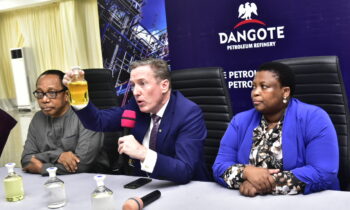Shell, Chevron Bonga and Agbami Projects To Attract $4 Billion In 2022
Following the signing of the Production Sharing Contracts (PSC) agreement by the Nigerian National Petroleum Company Limited and it partners, Bonga main, Bonga North, and Chevron operated Agbami Gas project are expected to attract about $4 billion in foreign direct investment before the end of this year,2022.
According to Bala Wunti, the group general manager, National Petroleum and Investment Management Services., the signing of the PSCs Agreement is in alignment with the country’s aspirations.
Today, we are at the verge of making history, the history to resolve all pending disputes in our PSCs with a potential to develop and monetize over 10 billion bbls and potentially generate revenue in excess US$500 billion to stakeholders and attainment of energy security for the country”.
NNPC Ltd on Friday executed renegotiated Production Sharing Contracts (PSC) to enhance Revenue, inflow of Direct Foreign Investment, expanded access to Affordable Energy and Job Creation
This is a major landmark achievement since its transition to a limited liability company under the Company and Allied Matters Act (CAMA).
The Petroleum Industry Act (PIA) was signed into law by President Muhammadu Buhari on 16th August 2021. This law gave NNPC the legal backing to renegotiate all her existing PSCs in conformance to the provisions of the new Act within a 1-year period.
The PIA in Section 311(2) stipulates that new PSC agreements under new Heads of Terms will be signed between NNPC Ltd as Concessionaire and her Contractor Parties within one year of signing the PIA into law, giving a deadline of 15th August 2022.
This provision paved the way for the resolution of lingering disputes which created investment uncertainty and stifled new investments in the nation’s deep offshore assets. To achieve this, NNPC Ltd leveraged on the near-end term of the PSCs and the parties’ interest to renew the PSCs as a negotiation currency in bringing the contractors to work towards trading the past for the future.
These renewed PSCs would provide several benefits such as improved long-term relationships with contractors, elimination of contractual ambiguities, especially in relation to gas terms, and enable early contract renewal amongst others.
The signing of the new PSCs is a key milestone achievement by NNPC Ltd which would ultimately unlock opportunities within the Nigeria Upstream sector. The execution of the PSCs will deepen investment and development of Nigeria’s rich petroleum resources and ensure that the trifold mandate of the NNPC Ltd to ensure energy availability, sustainability, and accessibility is achieved.
Ultimately, the new PSCs will provide inflow of Direct Foreign Investment, expanded access to Affordable Energy, Job Creation and Socio-Economic Development.”
The Oil Mining Leases OMLs)are renewed for another 20 years Oil Mining Leases, OML, for OML 125, 130,133, 132, 138, with the NNPC Limited and its partners signing revised Production Sharing Contracts, for the fields.
The renewal of the OMLs is expected to produce about 10 billion barrels of crude oil and generate about $500 billion in revenues for all the stakeholders involved.
Speaking at the PSC and Dispute Settlement Agreement, DSA, signing ceremony in Abuja, the Group Chief Executive Officer of NNPC Limited, Mele Kyari said the contract signing brought clarity to the deals which were first signed in 1993.
Kyari admitted that while there have been disputes concerning the PSCs for the OMLs in the past, the new agreements reached in line with the provisions of the Petroleum Industry Act, PIA 2021, ensure better clarity and process for dispute resolutions.
According to him, “We all know that in businesses, disputes are inevitable. Disagreements always come when there’s no clarity of understanding of the agreements that businesses go into and very often this is also complicated by laws that may not carry the necessary clarity that is required for businesses to go into contracts. And that’s how we landed in the 1993 PSCs debacle since 2007. This conflict has been raging and misunderstanding has become a major issue for all of us in the space leading to arbitration and all forms of litigation.




